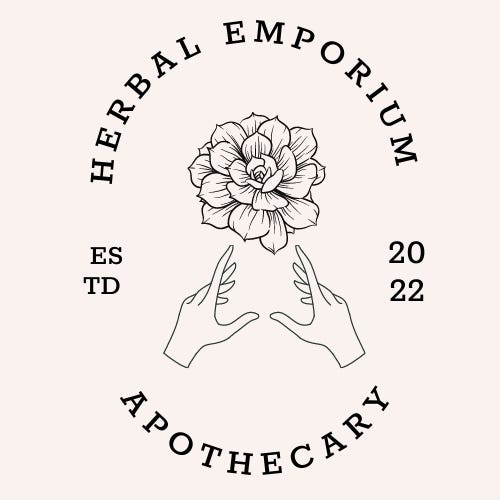Welcome back to Herbal Emporium & Apothecary.
I appreciate your patience with the schedule becoming awry last week. It was a birthday and the new year on top of working some extra hours helping out where I was needed. Helping others is something I always love to do and I have always been called to help wherever I am needed.
This publication has not been approved by your local health department or the FDA and is not intended to provide diagnosis, treatment, or medical advice. The content provided on this publication is for informational purposes only. Please consult with a physician or other healthcare professional regarding any medical or health-related diagnosis or treatment options. Information on this publication should not be considered as a substitute for advice from a healthcare professional. The claims made about specific products throughout this publication are not approved to diagnose, treat, cure, or prevent disease or ailments.

This week I wanted to cover a type of herb that may be useful to you and you have maybe heard the term adaptogen and wondered what that meant or what you’re supposed to do with it.
From Healthline: “Adaptogens are herbal pharmaceuticals. They work to counteract the effects of stress in the body. Stress causes very real physical changes in the body, including harming the neurological, endocrine, and immune systems. Adaptogens have stimulant properties that help counteract those harmful effects.”
Adaptogens have influence on immunity, sleep, stress levels, energy, and endurance. This sounds amazing, right? Well taking care of yourself with adaptogens can have an amazing effect on your health and life.

So what are they?
The concept of adaptogens has been around for thousands of years. They were labeled as “restorative” or “revitalizing” in older days and only recently the term of adaptogen has come to be used. Around 1940 is when we coined the term “adaptogen” that has the properties of “raising the nonspecific resistance of the body to stress so that the body is better able to adapt to stressful circumstances.” This term was created by the Soviets when they were researching how to make people better, faster, and stronger.
Adaptogens that the Soviets looked into were things like ginseng and eleuthero. Later another pair in 1968 (Israel Brekhman and Dr. I.V. Dardymov) developed the functional definition that we are aware of today. They noted that adaptogens have specific qualities:
they are nontoxic and safe for continual use
they increase resistance to stress and multiple stressors
they help normalize physiological responses despite prior stress-related changes in the body
Thanks to all the research done on adaptogenic herbs, we know that we have a unique way to support our bodies in many ways. Some of them are cardioprotective, neuroprotective, and radioprotective. Check out this article done on some adaptogens.

How to use?
Since these herbs are meant to help your body on many levels, they’re known for being used on a regular basis. Over time you may find yourself reaching for one over another based on the benefits you know it has and how you like its effects on your body so the length of time and the specific herb is completely up to you and what your preferences are. Our bodies also change over time and what you need or want now may be different in a year or two.
Always consult with your physician before starting a new herb because of the medications you may be taking or allergies you may have. Better safe than sorry!
You may also want to consult a master herbalist to gain information your doctor may not know about interactions as regular doctors may not know about herbal interaction with a medicine and you may glean some insight from a qualified herbalist on what research is out there about interactions with pharmaceuticals.
Since we want to return out bodies to homeostasis in natural ways we can do that by:
adaptogenic herbal tea and mixed drinks
adding adaptogens to food or smoothies (such as powder forms)
taking adaptogens as capsules
using adaptogens as tinctures
You can mix and match what works best for you and your lifestyle. A lot of people prefer tinctures because they are smaller and can travel with you and are easily added to other drinks that may taste better than the herb itself. Whatever works best!

Some Benefits:
Reduction in anxiety
Reduction of fatigue
Increasing energy levels
Regulation of emotional reactions to stressors
Increasing immune function
stimulate the nervous system (not a stimulant)
Enhance recovery after tough labor or exercise
Help maintain energy reserves
Which herbs are adaptogens?
Ashwaganda
Astralagus
Burdock
Eleuthero
Ginseng (American)
Ginseng (Asian)
Goji
Hawthorn
Holy Basil
Licorice
Maca
Nettle
Rhodiola
Schisandra
There are a few I know I left out but there are more to add to this list.
“The term adaptogen has not been accepted in Western medicine. This probably is due to a lack of good scientific studies and the difficulties in discerning adaptogens from other categories such as immune system modulators, tonics, anabolic agents, or antioxidants.”
From: Adaptogens: Herbs for Strength, Stamina, and Stress Relief
A lot of these can be added to smoothies or made into tinctures, but I will leave you with a nice elixir recipe. Really, it’s a smoothie but I love the word elixir.

Chocolate Cherry Protein Smoothie
10 Pitted dark cherries (frozen)
2oz Tart cherry juice (or substitute about 4-6 additional cherries)
1/2 cup milk
1/2 cup vanilla Greek yogurt (or use more milk)
1/2 Banana (preferably frozen)
1 scoop Chocolate protein powder
1 tbsp. Cacao powder
1/16 tsp Rhodiola Rosea
1/8 tsp Ashwaganda
add ice if you need it




